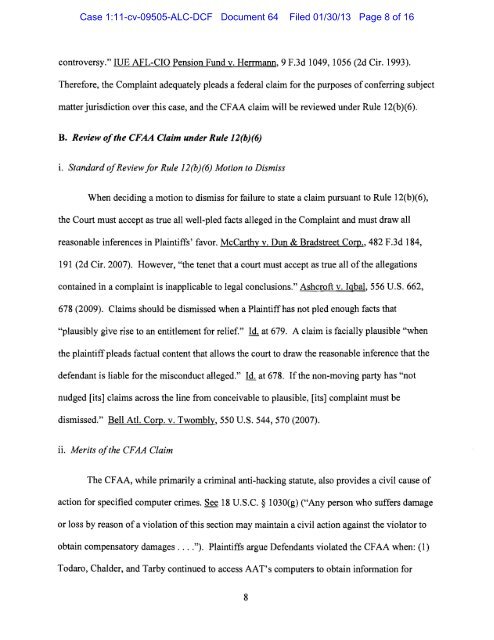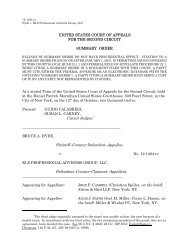Advanced Aerofoil Technologies, AG v. Todaro - Fair Competition Law
Advanced Aerofoil Technologies, AG v. Todaro - Fair Competition Law
Advanced Aerofoil Technologies, AG v. Todaro - Fair Competition Law
You also want an ePaper? Increase the reach of your titles
YUMPU automatically turns print PDFs into web optimized ePapers that Google loves.
Case 1:11-cv-09505-ALC-DCF Document 64 Filed 01/30/13 Page 8 of 16<br />
controversy." IUE AFL-CIO Pension Fund v. Hemnann, 9 F.3d 1049, 1056 (2d Cir. 1993).<br />
Therefore, the Complaint adequately pleads a federal claim for the purposes ofconferring subject<br />
matter jurisdiction over this case, and the CFAA claim will be reviewed under Rule 12(b)(6).<br />
B. Review o/the CFAA Claim under Rule 12(b)(6)<br />
i. Standard ofReviewfor Rule 12(b)(6) Motion to Dismiss<br />
When deciding a motion to dismiss for failure to state a claim pursuant to Rule 12(b)(6),<br />
the Court must accept as true all well-pled facts alleged in the Complaint and must draw all<br />
reasonable inferences in Plaintiffs' favor. McCarthy v. Dun & Bradstreet Corp., 482 F.3d 184,<br />
191 (2d Cir. 2007). However, "the tenet that a court must accept as true all ofthe allegations<br />
contained in a complaint is inapplicable to legal conclusions." Ashcroft v. Iqbal, 556 U.S. 662,<br />
678 (2009). Claims should be dismissed when a Plaintiff has not pled enough facts that<br />
"plausibly give rise to an entitlement for relief." Id. at 679. A claim is facially plausible "when<br />
the plaintiff pleads factual content that allows the court to draw the reasonable inference that the<br />
defendant is liable for the misconduct alleged." Id. at 678. If the non-moving party has "not<br />
nudged [its] claims across the line from conceivable to plausible, [its] complaint must be<br />
dismissed." Bell Atl. Corp. v. Twombly, 550 U.S. 544, 570 (2007).<br />
ii. Merits ofthe CFAA Claim<br />
The CF AA, while primarily a criminal anti-hacking statute, also provides a civil cause of<br />
action for specified computer crimes. See 18 U.S.C. § 1030(g) ("Any person who suffers damage<br />
or loss by reason ofa violation ofthis section may maintain a civil action against the violator to<br />
obtain compensatory damages ...."). Plaintiffs argue Defendants violated the CFAA when: (1)<br />
<strong>Todaro</strong>, Chalder, and Tarby continued to access AAT's computers to obtain information for<br />
8



